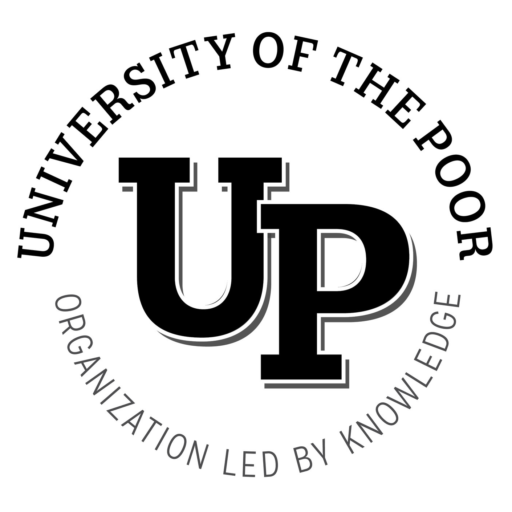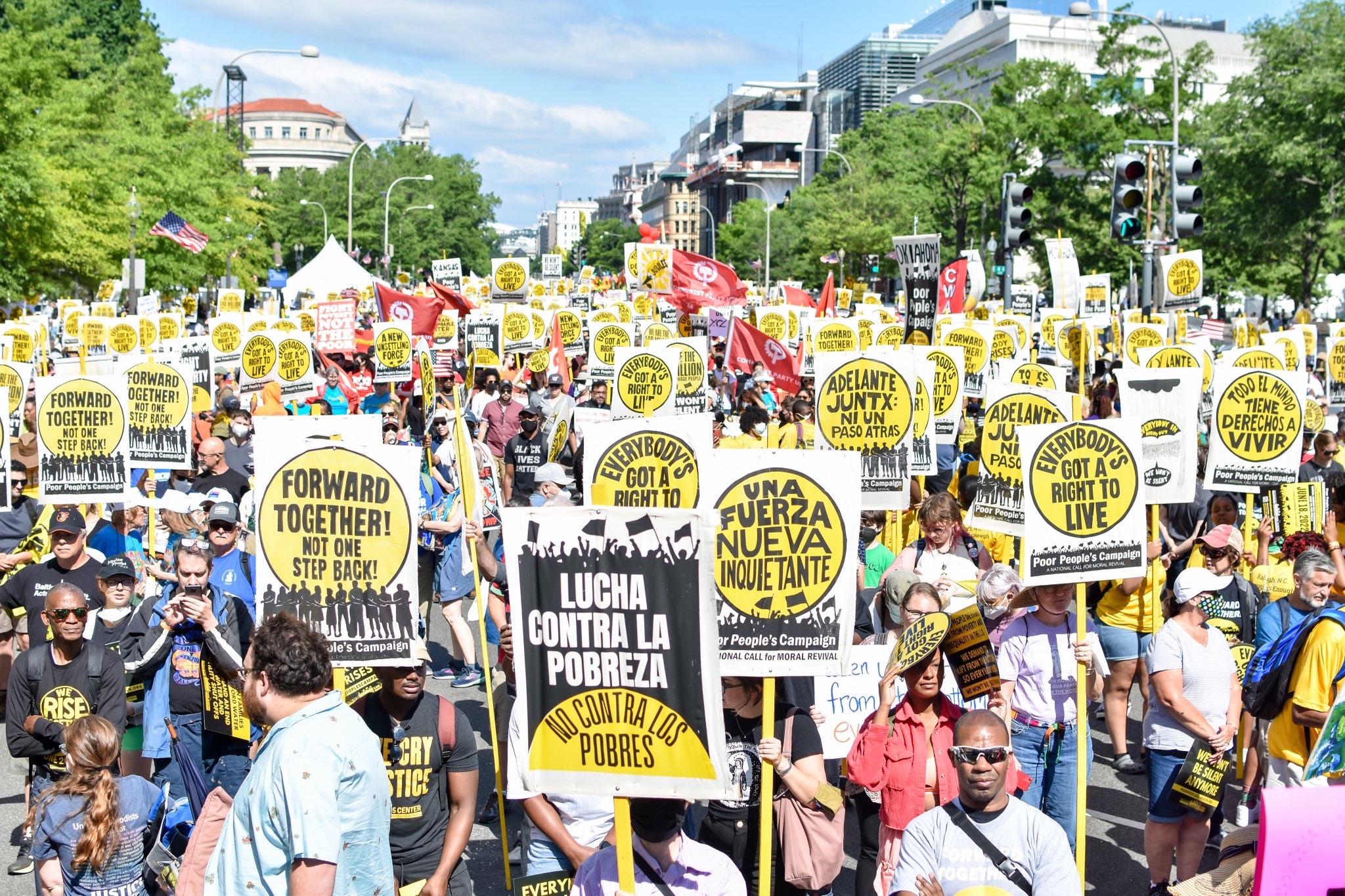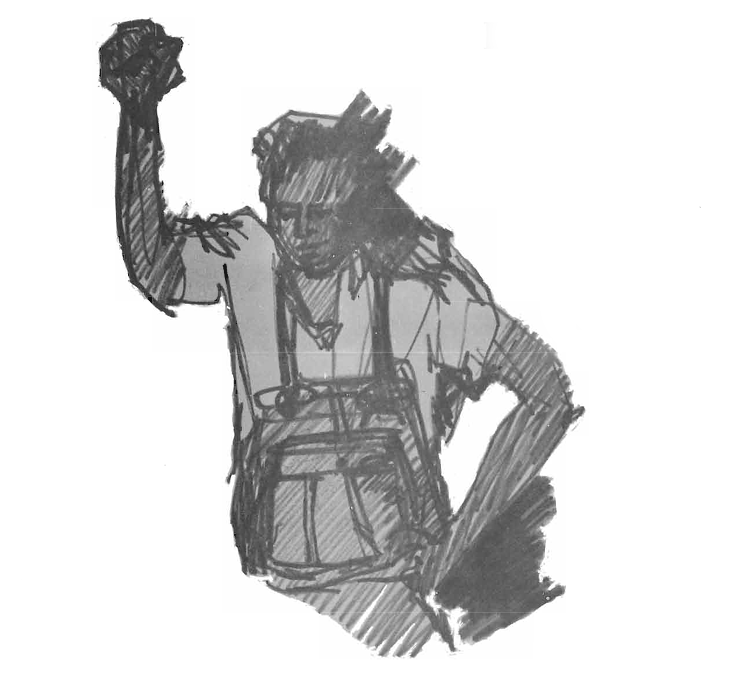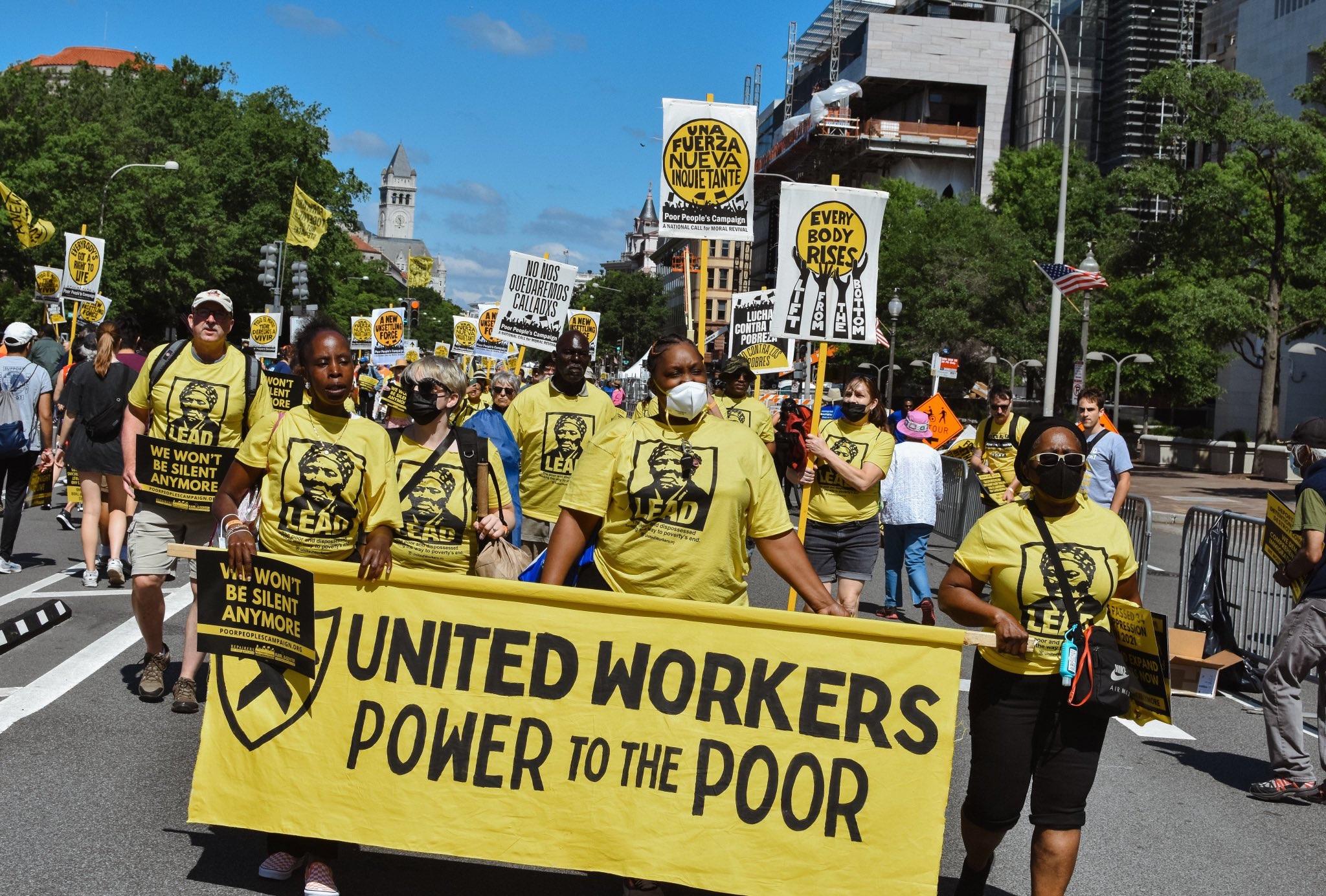By Moses H.M. and Noam Sandweiss-Back
“By the thousands we will move. Many will wonder where we are coming from. Our only answer will be that we are coming up out of great trials and tribulation. Some of us will come from Mississippi, some of us will come from Cleveland. But we will all be coming from the same conditions. We will be seeking a city whose Builder and Maker is God and if we will do this we will be able to turn this nation upside down and right side up. We may just be able to speed up the day when man everywhere will respect the dignity and worth of human personality and all will cry out that we are children of God.”
Rev. Dr. Martin Luther King, Jr., Why We Must Go to Washington (SCLC Staff Retreat, January 1968)
On June 18th, 2022, thousands of poor people and people of conscience gathered in the streets of Washington D.C. for the Mass Poor People’s and Low-Wage Workers Assembly and Moral March on Washington and to the Polls. Over 50 years after the 1968 Poor People’s Campaign, the June 18th rally brought together leaders, struggles, and organizations from across the country into a unified cry of justice. Below are 11 key takeaways on the significance and lasting power of June 18th.
- The Emerging Unity of the Poor and Dispossessed
In the spring of 1968, Rev. Dr. Martin Luther King, Jr. pulled together a meeting with leaders from poor people’s organizations across the country. Representatives from the Black Freedom Struggle, poor white communities in Appalachia, the American Indian Movement, Chicano organizations from the West Coast, and more gathered to make plans for the Poor People’s Campaign. Although they would hit insurmountable hurdles, including the assasination of Dr. King, that meeting and the encampment in DC that followed was an unprecedented moment when the poor of the nation began to move together under one banner.
On June 18th, something similar happened. On that day, poor people came together in an historic way. It was historic that poor and dispossessed people traveled from almost every state to stand alongside one another in Washington DC. And it was historic that the mass of people who were there bridged the rural and urban divide, racial and ethnic differences, religious (and non-religious) affiliation, and more. The tens of thousands of poor people who gathered in DC stood together not on the basis of one identity, issue, or organization, but on the basis of their shared position within our economic system. The tens of thousands more who gathered in moral solidarity joined under the leadership of the poor. Celebrating and understanding what June 18th represents will help us move together with greater unity in the days ahead.
- Size and Organization
The sheer size of June 18th is a victory in itself – reports suggest there were close to 150,000 people in D.C., with hundreds of thousands more tuning in online. But it is critical to understand that the people in attendance on June 18th were not a random group of individuals. To be sure, there were many people who came on their own because they heard about it and felt compelled to be there. But at the heart of the mobilization were organized delegations of PPC state campaigns, poor people’s organizations, labor unions, faith communities, and local, state, and national groups focused on everything from the climate crisis to housing. These delegations made a powerful impression on June 18th and they represented communities and organizations with a combined reach in the millions. It is also important to note that June 18th made possible the unity, for at least that day, of many differant communities, issues, and organizing silos. This is the basis of fusion politics and the mobilization offered a glimpse into what it could look like to break through the lines of division that continue to keep poor people from coming together.
- The Reach and Momentum of June 18th
It is too early to tell what the long-term impact of June 18th will be and the ripples from that day are still being felt. For now, we can appreciate the day for its power and the promise it holds for an even bigger and bolder campaign. In the lead up, thousands of organizers and state leaders across the country reached out to people who showed up in person and tuned in online. In turn, these people reached thousands more. All of the outreach and organizing that went into June 18th – the 1-on-1 conversations, phone calls, canvassing, bus rides, and more – was perhaps just as important as the day itself, at least in terms of building new relationships and popularizing the work of the PPC.
Many leaders from PPC state campaigns and partner organizations have said that they left D.C. energized and committed to doing more. For state campaigns, partner organizations, and the PPC as a whole, June 18th had a real broadening effect. In the second year of a pandemic that has shifted how all of us organize, June 18th was a big bet that paid off, and it has only further legitimated the PPC as a force to be reckoned with.
Rev. Nelson Johnson of the Beloved Community Center in Greensboro, NC, often says that “We mobilize to, so that we can organize from.” The PPC lived into this message on June 18th and in the months that followed. Now, in the lead-up to the midterm elections, the PPC is reaching out to 5 million low-propensity, poor and low-income voters in key states. This effort is grounded in an understanding that poor people are a sleeping giant and that their ability to mobilize, organize, and vote together is the key to transformative change in this country.
- Foundations of the Poor People’s Campaign
The Poor People’s Campaign may have formally launched in 2018, but its foundation is built on the long history of struggle in the United States. From the uprisings in Watts to the rise and demise of the original National Union of the Homeless to the explosive Moral Mondays Movement in North Carolina, the PPC stands on the shoulders of past struggles, movements, and hard won lessons. The unity of the two anchor organizations, with rich organizational histories, illustrates the promise and possibility of a moral fusion organizing framework.
Likewise, the composition of the coordinating committees of the over 40 state campaigns each reflect a diverse range of experiences and histories in their own leadership. Each coordinating committee is made up of state leaders and directly impacted people from various houses of worship, unions, campaigns, and organizations all coming together in one movement. On June 18th, the breadth and power of this diverse leadership showed that the unity of these leaders is our greatest strength.
- The Poor People’s Campaign Leading Up to June 18th
The Poor People’s Campaign launched in the summer of 2018, when poor people and moral witnesses in 40 states committed themselves to a season of direct action. From the start, the goals of the PPC have been three-fold: 1. To shift the moral narrative around poverty and its interlocking injustices 2. Impact policies and elections and 3. Build long-term power among poor and low-income people. The PPC has made some important breakthroughs since 2018, including:
- Launching the largest and most expansive wave of civil disobedience in the 21st Century.
- Convening over 1,000 leaders in Washington D.C. for a Poor People’s Moral Action Congress in 2019.
- Continuing support of deep, on-the-ground organizing and key struggles on the frontlines (most recently the Jackson Water Crisis, Public housing crisis in Philadelphia, Memphis pipeline fight, and more).
- Embarking on multiple national tours, including a 25+ state We Must Do M.O.R.E. Tour leading up to the 2020 elections.
- Holding the largest gathering of poor people online during the first year of the pandemic.
- Introducing the Third Reconstruction Resolution to Congress in 2021.
- Continuing to shift the moral narrative around systemic racism, poverty, militarism, and ecological devastation, along with the release of a series of groundbreaking reports including: Poor People’s Moral Budget, Unleashing the Power of Poor and Low-Income Americans, and A Poor People’s Pandemic Report
- Holding a multi-state M.O.R.E. Tour in the months leading up to June 18th.
- Pioneering a model of moral fusion organizing that centers the leadership of poor and low-income people across lines of division.
June 18 would not have been possible without the years of organizing, mobilizing, educating, and registering that the PPC has spearheaded. All of this work tilled the soil and sowed the seeds for a mobilization of this scale and significance.
- The Role of Clear, Committed, Connected, and Competent Leadership
There were thousands of people who labored over the course of many months to make June 18th happen. This enormous undertaking, and the leadership of clear, committed, connected, and competent leaders within it, reminds us why it is so important to focus on political education and leadership development at every step of our organizing, so that we can take full advantage of moments like June 18th and build on them. June 18th was also no doubt an important moment in the lives and development of new and emerging leaders. As a revived political and class consciousness emerges across the country, June 18th offered a new generation of young and poor people an insight into what it means to commit to joining a powerful social justice movement.
- The Convening Power of the Poor People’s Campaign
June 18th demonstrated at least two things about the PPC within the larger movement landscape. For one, it demonstrated that the PPC has a real convening power. We cannot think of many other political vehicles that could have convened the immense diversity in attendance on June 18th centered around the agenda and political program of the poor. For another, June 18th demonstrated that the PPC is perhaps uniquely focused on convening this kind of moral fusion coalition. We also can’t think of another political vehicle that would identify the need to build a fusion movement with poor people in the lead. In a time of growing poverty and widening inequality, we believe this kind of organizing is our best bet for a real political breakthrough in this country.
- The Voices of June 18
Poor people from across the country made up the core of the program on June 18. The stage was built for the stories and demands of this diverse group of organized poor people who spoke about their own plight, fight, and insight – even the choir that day was made up of state leaders and organizers from across the country. As the PPC works to shift the moral narrative of the country, June 18 saw the presence and leadership of the poor and dispossessed in a visible, public, and powerful way in our nation’s capital.
- The International Context
This is a time of historic and global crisis – from climate disaster, to economic recession, to the rising reality of authoritarian political movements. Within this context, poor and dispossessed people across the world are waging concerted and courageous campaigns, from local struggles to struggles for governing power. There is an important role for a movement of the poor and dispossessed in the United States to play in the international fight for human dignity and environmental justice. June 18 was both a rallying cry for the poor of this country and a message of hope to the poor of the world: “we stand with you and by coming together we link our struggles with yours”.
- A Training Ground and a Stepping Stone
It is important to remember that the work leading up to June 18th was not always easy. But even the challenges were a training ground and an opportunity for developing deeper experience among our many communities. This is the nature of building a movement of the poor and dispossessed. The people and organizations that helped to anchor and build this mobilization are the still emerging cornerstone of the movement to end poverty in this country. We know that even when our movement grows – as it will, as it has to, and in ways we can’t anticipate or control – things will remain hard, scrappy, and full of contradictions. June 18th was an important reminder of this and a powerful stepping stone for a movement that is grounded in the struggles and leadership of the poor, connected across lines of division, and national in scope.
- The Champions of June 18th
The June 18th program saw movement elders and leaders affirm the importance of this mobilization and what it signified in terms of demonstrating the political leadership of poor people across the country. Notably, towards the beginning of the program, Bernice King, the daughter of Rev. Dr. Martin Luther King Jr., acknowledged Rev. Dr. William J. Barber, Rev. Dr. Liz Theoharis, and the thousands of state leaders who were present as heirs to her father’s legacy:
“Fifty-four years ago, my father marched the Poor People’s Campaign to revolutionize the economic landscape of our nation. Unfortunately, Rev. Dr. Martin Luther King Jr. did not live long enough to see it come to fruition. However, on June 19, 1968, my mother Coretta Scott King was here in our nation’s capital during the initial Poor People’s Campaign to deliver a very powerful message on poverty. She said, “too long have we suffered pious platitudes and made faulty promises to our less fortunate.” She made the appeal that poverty was not only a longstanding evil of this nation, but an actual act of violence against the dignity, livelihood, and humanity of its citizens….
Today as a bearer of my parents’ legacy, and as the CEO of the King Center, I join in solidarity with the chorus of voices that say, ‘We won’t be silent anymore!’ Thank you Rev. Barber and Rev. Theoharis for helping to keep this part of my father and mother’s legacy alive! And thank YOU [the audience] for keeping the movement going!”
Moses H.M. is a member of the University of the Poor and organizes with the Poor People’s Campaign: A National Call for a Moral Revival and the National Union of the Homeless. He teaches drama, develops programming for trans and nonbinary youth and young adults, and is a member of the Church of the Common Ground in Atlanta, GA.
Noam Sandweiss-Back is the Director of Partnerships for the Kairos Center and supports the national work of the Poor People’s Campaign.
Top image: Emily Farthing



